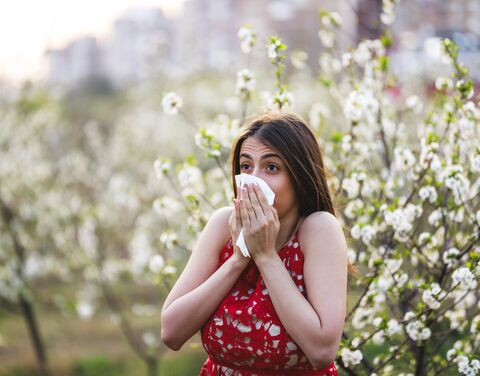
What can you do to combat hay fever?
Leaves are appearing on trees, meadows are carpeted with new blooms, and birds are tweeting everywhere, but not everyone's pleased to see the onset of spring. For one in five Swiss people, nature's reawakening means only one thing: the start of the dreaded hay fever season.
Hay fever, an allergy to pollen, is common.
In fact, with around 20 percent of people affected, pollen allergy is the most widespread allergy in Switzerland. Allergens like hazel and elder pollen are already filling the air, and ash trees are also adding to the mix in many areas. The result? Allergic reactions all over the place: streaming eyes, itchy skin, a nose that's somehow runny and congested at the same time, severe attacks of sneezing, and breathing difficulties that can even turn into asthma.
We've put together some tips to help you get through the pollen season. They range from everyday lifestyle changes to drugs, desensitization therapies, and complementary medicine.
Everyday tips for dealing with hay fever
Simply avoiding pollen day to day can prevent hay fever or at least reduce the symptoms. Here are some tips to help you:
- Keep track of the latest pollen forecast: pollenundallergie.ch (Switzerland) or polleninfo.org (Europe).
- Ventilate your home briefly but thoroughly, ideally early in the morning, to limit your exposure to allergens.
- Wash your hair before you go to bed so that less pollen gets into your bed.
- Wear sunglasses outside to protect your eyes from pollen.
- Take off your clothes before you go into the bedroom and store them in another room. This helps to reduce the amount of allergens in your bedroom.
- Don't dry your laundry outside – and preferably not close to a window – because fabrics tend to trap pollen.
- Eat more onions and garlic, both of which have an anti-allergic effect for hay fever sufferers.
- Adapt your exercise habits. Do more indoors or in the early mornings, when there's less pollen in the air.
You can also fit pollen filters to your windows and get an after-market pollen filter for your car if it doesn't already have one.
Pollen allergy treatments
Hay fever can sometimes be so severe that it eventually causes problems in spite of all efforts to prevent it. An allergy that remains untreated for a long time can, in the worst-case scenario, develop into allergic asthma. There are various treatments designed to help you avoid this.
The list below is only an overview, and you should always consult a doctor before starting any treatment.
Hay fever drugs
A number of drugs with various active ingredients are available to treat pollen allergies. Some block the allergic reaction, some restrict the production or effect of substances known as inflammatory mediators. Always consult a doctor before taking any drug. He or she might prescribe any of the following, depending on your symptoms:
- Nasal spray
A nasal spray will relieve symptoms such as a runny, sore or congested nose. It might also help with hay fever symptoms that affect the eyes. - Eye drops
Eye drops are specifically designed to treat irritated, streaming or red eyes. - Allergy drops
Allergy drops are mainly used for children who suffer from pollen allergies. They contain active ingredients that block allergic reactions and ease allergy symptoms. - Pills
Various kinds of pills treat the different symptoms of pollen allergies. They can contain a range of different ingredients that could potentially cause side-effects.
Specific immunotherapy for hay fever
This method is aimed at desensitizing the body. Patients are administered the type of pollen that causes their allergy in increasing doses over several years in the form of injections, pills or drops. The aim is to allow the body to get used to the pollen and build up a resistance to it so as to reduce or even eliminate the allergic reaction.
Complementary medicine for hay fever
Complementary medicine also has treatments to ease pollen allergy symptoms. You should consult a therapist to decide which method is best suited to your pollen allergy.
Here are some of the options:
- Acupuncture
Acupuncture is part of traditional Chinese medicine (TCM). It aims to achieve a therapeutic effect by inserting needles into specific places on the allergy sufferer's body. - Homeopathy
Homeopathy treats the allergy using a substance that, when undiluted, would trigger an allergic reaction in a non-sufferer. It's based on the principle of "similia similibus curentur" (Latin for "like cures like"). - Phytotherapy
Phytotherapy is the therapeutic use of plants and plant extracts. The idea is to treat symptoms with natural substances that have anti-inflammatory, decongestant, and other properties.
When will my basic health insurance pay for hay fever treatment?
Regardless of whether you opt for drugs, desensitization or complementary medicine, you'll have to pay. The good news is that your basic health insurance will cover the cost of certain treatments.
Are you getting medical treatment for your pollen allergy? If your doctor prescribes a drug, your basic health insurance will cover some of the cost, provided the drug is on the list of specialties published by the Federal Office of Public Health.
It may even cover the cost of some complementary medicine treatments, subject to certain conditions – if a properly qualified doctor administers acupuncture, for instance.
When does my supplementary insurance help with hay fever treatments?
Do you have sore eyes and a runny nose but no other form of allergic reaction? If so, preventive desensitization might make sense, but it isn't covered by your basic health insurance. Supplementary insurance can help here.
Likewise, not all hay fever drugs are covered by basic insurance, so supplementary insurance can be useful here too.
To sum up, here's what you can do to combat hay fever
There are lots of methods and treatments to prevent an allergic reaction to pollen or combat an existing allergy. It's important not to ignore hay fever because it could eventually lead to asthma.
Take note of our tips for steering clear of allergens and reducing your body's production of histamines. If they don't help, consult your doctor to find the drugs or treatments that best suit your needs.
That way, you too can enjoy spring to the full in the open air.






